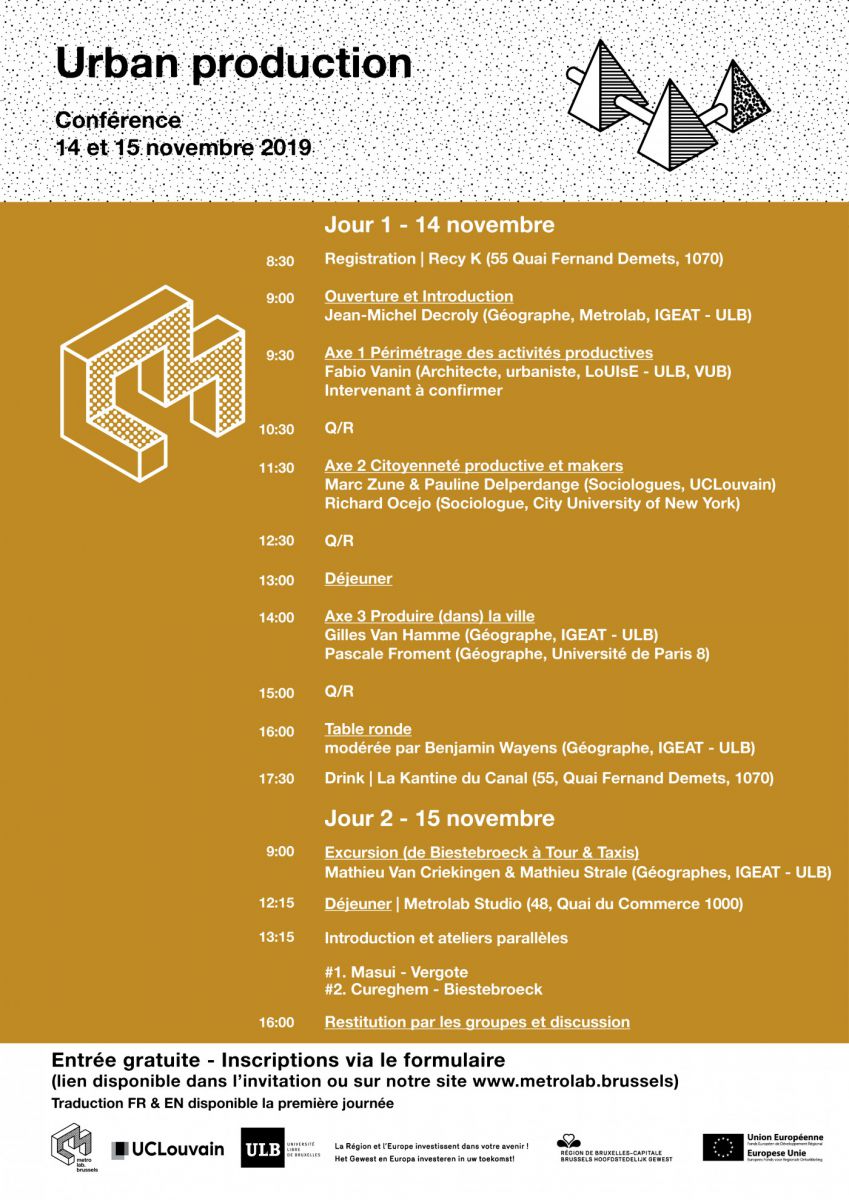Urban Production
Metrolab Brussels' scientific program is structured by three main axes of research - urban inclusion, urban ecology, urban production - which correspond roughly to the social, environmental and economic dimensions of sustainable urban development. The third topic tackled by researchers is therefore urban production, in 2019-2020.
Urban Production: produce (within) the city
If the city is a produced space, which is embodied in the morphology of the built environment, it is also a productive space in which so-called productive activities take place. For at least two centuries, the latter have been assimilated to manufacturing industry, i.e. to the companies that transform materials into finished products. This equivalence is no longer structurally verified today. On the one hand, material processing activities are carried out outside industry, for example in the construction sector, energy production, urban services (water production and distribution, waste collection and treatment, etc.) or in certain services (car repair, repair of used equipment, food wholesalers, etc.). On the other hand, industrial companies increasingly rely on service activities, sometimes related to their own operations (cleaning, accounting, etc.) and sometimes to the products they manufacture or process (promotion, installation, maintenance). The definition of productive activities is therefore extremely vague, which can have repercussions on public action: the productive activities promoted or banned in the urban space will depend on the perimeter used to define them.
While European and North American cities were the scene of a rapid development of productive activities in the nineteenth century and the first half of the twentieth century, they have since been undergoing strong deindustrialisation. Due to a combination of several factors (lower density and profitability than other urban functions, inability to bear high land charges, low attractiveness for an increasingly skilled urban workforce, negative impact of urban congestion, induced nuisances, etc.), industrial companies are struggling to maintain themselves outside the monofunctional areas reserved for them.
In terms of access to land, access to public funding or the images associated with them, productive activities have thus become weak functions, subject to strong competition from the strong functions that have become housing - for the middle and upper classes - and services, especially those likely to capture external economic potential.
In response to this development, regional, national and supranational public authorities have been working for the past ten years to encourage the establishment of new productive activities in the urban fabric. To this end, they are promoting emerging production methods based on the increasing integration of digital technologies (Industry 4.0, for example through 3D printers), on the exploitation of material deposits linked to urban waste (circular economy) or on the symbolic valorisation of products from the “urban terroir” (craft industry). Similarly, they encourage the spin-off of coworking areas and the multiplication of small production units run by individual entrepreneurs (the “makers”), in particular through the design of business incubators.
At the same time, the public authorities seem neither willing nor able to stem the haemorrhage of formerly established productive activities, such as the production of building materials or the agri-food industry, despite the sometimes significant contribution of the latter to the satisfaction of the basic needs of the population, the working population and other companies established in the city (see “foundational economy”). In addition to the strong tensions that exist between productive functions and other urban functions, there are also tensions between productive activities themselves, more specifically between those that seem to embody industrial innovation and those that are said to bear witness to a bygone past
These reflexions issued from the Urban Production conference and served as a basis for the Urban Production MasterClass which took place in January-February 2020. Geoffrey Grulois, Pauline Varloteaux, Louise Carlier and Marco Ranzato were involved in the organisation of both events and will contribute to the Urban Production publication, which will be issued at the begining of 2020.
LoUiSe researchers involved in Metrolab also regularly organise seminars on this topic and actively take part to individual and collective research on urban production.

